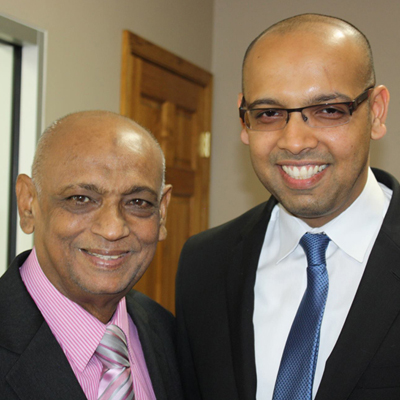This is the story of 37-year-old Murtaza Jaffer and his father, Safderali Jaffer, whose bladder cancer had metastasized to his kidneys. It is a story of a family so tightly bonded that they live next to each other, and so intensely loyal that they would do anything for one another. Which is what Murtaza did.
Safderali and his wife followed their two sons, who had left Tanzania for college in the Lehigh Valley nearly 20 years ago. He kept his accounting business operating, but he wanted the U.S. to become their new home. Murtaza and his brother bought a printing business, EBC Printing in Trexlertown, 15 years ago. It grew, and now thrives.
Suddenly, eight years ago, Safderali was rushed to the hospital with unusual bleeding. Bladder cancer. No one is ever ready for such a diagnosis, and the Jaffers were especially shocked as Safderali was healthy, didn’t smoke, ate well, and had no family history of cancer.
The doctors removed his bladder. But there was more, for cancer had invaded his kidneys. He’d need dialysis for his failing kidneys — nearly eight hours a day, three days a week. Forever. He endured this punishing regime for a year.
There were options, one of which was a kidney transplant, but, somehow, this option didn’t really register with Murtaza. He knew about it, but he didn’t focus on it. Yet, it was there, burrowing in. He watched his father stoically undergo dialysis week after week. And then, one night, he attended a seminar for transplant recipients and donors.
“I met a man who had anonymously donated his kidney to an unknown recipient. He said he did it for his faith. And I thought, ‘If he can do this for his faith, I can do this for my dad’” says Murtaza.
His mind was made up. He contacted the hospital, researched the procedure, had himself and his brother tested for compatibility. They both matched. But Murtaza resolved to be the donor.
“The hardest part,” he shakes his head, “was dealing with my family, not the surgery.” He had to persuade his mother and sister—and his father. Only his brother and his wife supported him. “Half my family said not to do it: I was just starting life, and my wife was about to have a baby.” But he was adamant.
After surgery—which he knew would be tough—he felt as if he’d been hit by a bus. “But my dad,” Murtaza smiles, “felt as if he’d been given a Rolls Royce engine. When I shuffled into the room, he waved and said, ‘Hey, partner!’”
Two months later Murtaza regained his energy and returned to work.
His father was joyous: strong, independent, free of exhausting dialysis. “Two great years,” Murtaza nods happily.
Finally, Safderali’s transplant doctor permitted him to travel, and he and his wife headed to Tanzania to close his accounting business and say goodbye to friends and relatives so he could return to the Lehigh Valley and play with his grandchildren.
And then, in the midst of his trip, excruciating back pain crippled him. Murtaza and his brother flew over. The doctors thought sciatica might be the cause. They took x-rays, and were puzzled by the dots on Safderali’s spine.
At last, the family decided that they must get Safderali to the Lehigh Valley for the high-quality medical care he’d had so far. The pain coursed through him during the day-and-a-half-long flight. Transferring him from one plane to another was agonizing, but, ultimately, he arrived at Newark Airport.
His family intended to rush him to the hospital, but he wanted to pause a moment. He asked for one night at home.
The diagnosis was grim. The dots on his spine were cancer. The bladder cancer which had metastasized to his kidneys had now metastasized to his spine. There was nothing more to be done.
But Safderali didn’t feel done. When his doctors explained that he had limited time, he didn’t believe them. It fell to Murtaza’s mother to tell her husband he was not going to make it. “She was the strong one throughout this,” Murtaza acknowledges grimly. “She took care of his physical needs and gave him emotional support. I don’t think my brother and I could have done this.”
Murtaza called the Cancer Support Community the day he learned his father was terminal. He’d found a brochure in the doctor’s office. He was looking for help, for he was in shock. “Time was against me, so I never came. If I had had more time, I would have brought my family.” But he toured the offices and met the staff.
Safderali died six weeks after his return. Murtaza had given his father a transformational gift that allowed him to resume his life, and then to put it in order, tie up loose ends, bid farewell.
In fact, the transplant was a way for everyone to bid farewell.


